You’ve probably already learned the extremely common greeting Come stai? (“How are you?”) in Italian, but what if you want to ask what someone is up to? In this case, you can use the expression:
Che fai di bello?
What are you up to?

Che fai…? , the variation Cosa fai…? and the more formal Che cosa fai…? can mean one of two things depending on the context:
- What do you do? (generally speaking)
- What are you doing? (in this specific moment)
This is because Italians often use the present tense in situations where English speakers would use the present continuous tense (-ing). In the case of this week’s phrase, Che fai? is best translated as What are you doing? or What are you up to? because the speaker wants to know what the other person is doing right now, or in the near future.
Che cosa fai di bello?
What are you doing? / What are you up to? (right now)
Che fai di bello quest’estate?
What are you doing this summer? (in the near future)
Note that the continuous Che cosa stai facendo (di bello)? (lit. What are you doing?) can also be used, but only for the present moment.

Di bello is a commonly used expression that literally means “…that is nice / interesting”. We don’t really have an exact equivalent in English but it is used a lot in Italian to add a friendly tone to the question. Here are a few other example phrases in which di bello appears:
- Che cosa mi dici di bello? = What’s up? (lit. What nice things are you going to tell me?)
- Dove vai di bello? = Where are you off to? / Are you going anywhere nice? (lit. Where are you doing that’s nice?)
- Che cosa danno di bello in TV? = Are they showing anything good on the TV? (lit. What nice things are they showing on the TV?)
- Cos’hai fatto di bello oggi? = Did you do anything interesting today? (lit. What nice things did you do today?)
It is possible to swap bello with various adjectives including brutto (bad), interessante (interesting), nuovo (new), diverso (different) and so on.
Non faccio niente di interessante.
I don’t do anything interesting.
Heather Broster is a graduate with honours in linguistics from the University of Western Ontario. She is an aspiring polyglot, proficient in English and Italian, as well as Japanese, Welsh, and French to varying degrees of fluency. Originally from Toronto, Heather has resided in various countries, notably Italy for a period of six years. Her primary focus lies in the fields of language acquisition, education, and bilingual instruction.


